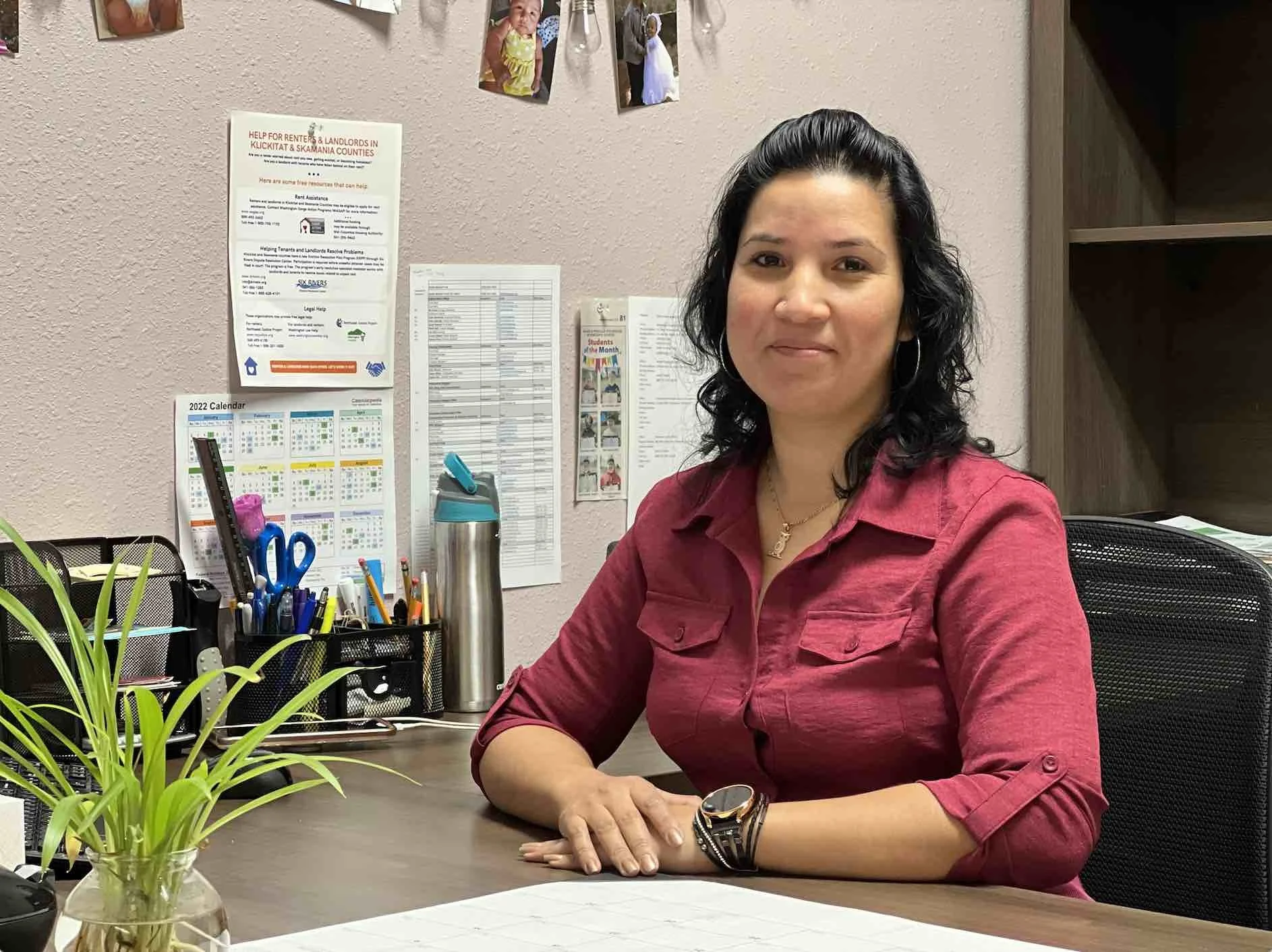Living Undocumented Part 3: Living with the uncertainty of DACA
Part 3: A local woman’s path to empowerment
Living with the uncertainty of DACA
Patty Gallardo at work at Washington Gorge Action Programs where she now works as a Human Resources Assistant. Photo Credit: Washington Gorge Action Programs
by Tamara Kauffman
Immigration is a complicated issue. People migrate for many reasons. They may be looking for better economic opportunities, fleeing violence or persecution. They may be searching for different climates, looking for adventure, or seeking a different culture where they feel more included.
When it comes to traveling, most Americans take it for granted that they can go around the world without much bother. But, for Patty Gallardo, because of her immigration status, a trip to Mexico to visit her seriously ill mother might have life-altering consequences. She might not be able to return to the United States. She has a lot to lose, including contact with her five children.
Gallardo has lived here since she was eight years old. Her mother brought her across the border without a visa, which meant she entered the country unlawfully. Since that time, Gallardo has only known the U.S. as her home. As an undocumented immigrant, she grew up and raised a family facing many hardships along the way.
In her early 20s, Gallardo realized how important it was to pay taxes when working and receiving income. She saw that taxes helped support schools and social programs, which were vital to her family and the community.
She learned that even though she didn’t have a green card or a Social Security number, she could apply for an Individual Tax Identification Number or ITIN and contribute to society.
“Paying my taxes was a good thing,” Gallardo said. Years later, it would help her become eligible to receive a work permit and qualify for a Social Security number.
As Gallardo was doing her best to carve out a life for herself and her family, the U.S. was struggling to modify immigration law. The Development, Relief, and Education for Alien Minors (DREAM) Act was first proposed in 2001. And by the end of 2010, Congress could not agree on a path to citizenship for certain immigrants brought to the U.S. as children.
Then in 2012, President Barrack Obama made it possible for some young non-documented immigrants to avoid deportation and obtain work permits for two years through the executive order, Deferred Action for Childhood Arrivals (DACA).
Immigration Attorney, Michelle Israel, said, “(With) this DACA program, they (the federal government) have decided to go ahead and proactively identify a specified group of people that they have no interest in deporting.” Thus, directing resources toward other immigration issues more likely to affect the safety and security of the nation.
She explained the president set a very high standard for DACA recipients. To be eligible, young immigrants had to fall within very specific requirements for their age, the length of time they had been in the United States, and their status upon entering the country. They also had to be working on, or have completed, schooling or military service with an honorable discharge, and be in good standing with no felony convictions or significant misdemeanors. The program is not a pathway to citizenship.
Only immigrants under age 31 as of June 15, 2012, who, like Gallardo, were brought to the U.S. before their 16th birthday are eligible to apply. That is approximately 1.7 million people.
In 2014, after living in the country for 22 years, Gallardo was approved for DACA. Now, she has to reapply every two years to retain her work permit and status. But she is not allowed to leave the country without permission.
Gallardo has applied for Advance Parole, a status that would allow her to travel to see her ailing mother, who eventually returned to Mexico. But there is no guarantee, even with receiving advanced permission to travel, that she would be allowed entry back into the United States.
She worries about her family if she is approved for travel and then is denied re-entry. Her children are all U.S citizens. Her youngest is four years old, and she fears her children will be removed and placed in foster care.
To further complicate matters, the current status of the entire DACA program “is under attack,” according to Israel. She is referring to recent litigation and appeals surrounding Texas v. U.S., which challenges how DACA was founded.
“If it is found that the program is not legal, then the program would have to shut down,” Israel said.
Israel said that termination of the program for the more than 800,000 approved DACA recipients could “mean that all of those people would go from having the ability to work, drive, pay their taxes, support their children and families, go to college, bank and all of that…to, ‘You now no longer have status.’”
This national level of indecision leaves Gallardo and others like her in constant limbo. She will continue to file her paperwork every two years as long as DACA remains intact and hopes that one day she will have an opportunity to qualify for permanent residency. For now, she is taking it one day at a time.
Click to read Living Undocumented Part 1: One Local Woman’s Path to Empowerment.
Click to read Living Undocumented Part 2: The importance of a Social Security Number.
Support Local News
We’ve made it our mission to bring our communities closer together by improving access to honest local reporting with a free, paperless new service that is updated daily in both English and Spanish. Please consider helping us to build equity and lift up our communities up by donating to support this vital service today.


